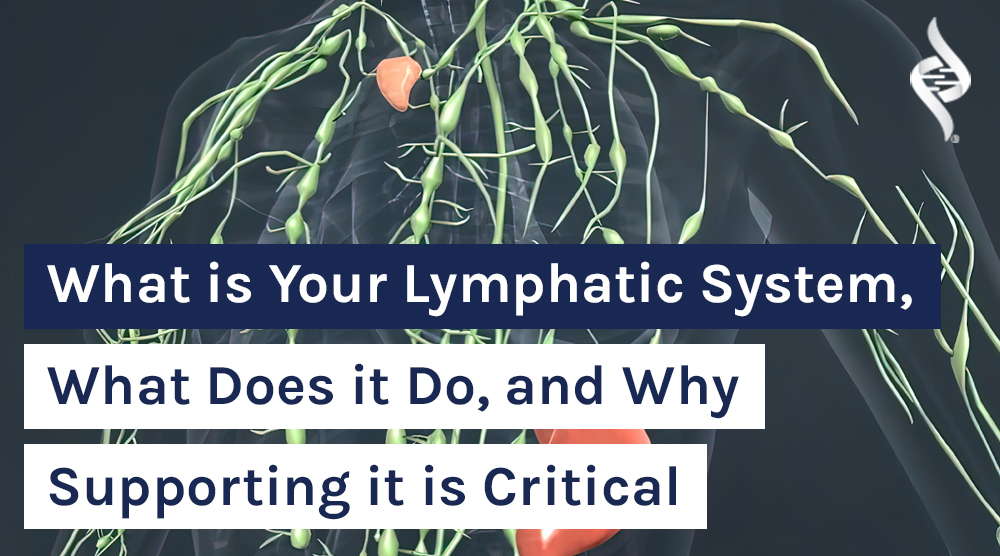What is Your Lymphatic System, What Does it Do, and Why Supporting it is Critical
Video Transcript:
Today, I’m going to share with you a very broad overview of your lymphatic system and all of the different tissue, organs, and elements involved in keeping this really, really important immune and detox process working optimally.
So, your lymphatic system is a network of vessels and organs that help balance your fluid. They help defend and support your body against an infection – so, any type of foreign invader, be it a pathogen or a virus or a bacteria – and the lymphatic system actually helps transport fat from your digestive process.
And I’m going to share with you, I’m a lymphatic specialist. That’s really a core part of my practice, working with individuals who have dysfunctions and disorders of the lymphatic system. So, this is a very, very broad view. I usually deep dive into this, but I’m really trying to keep it in a way that it’s going to give you a broad overview of all the different organs and ways the lymphatics support you. And then I’m going to share with you some tips on how to support it.
Your Lymphatic System Helps Your Immune System Fight Invaders
The lymphatic system also is a huge part of your immune system. And what it does is it actually helps to notify your system, notify your body, that there’s a foreign invader, and then it triggers this whole process to fight off the foreign invader. And it does this through the structure of the lymphatic system.
So, the lymphatic system has lymph vessels, very similar to your capillaries or your vascular vessels, but the lymphatic system is a lot thinner and it’s even more fragile, and there’s no pumping mechanism to the lymphatic system.
So, the heart pumps the cardiovascular system, but there’s no internal pump, specifically, to the lymphatic system. The arterial pressure from your vascular system, there’s a webbing, a connection, and that is the only thing that really forces things into the lymphatic system from a pumping mechanism. But externally, that’s one of the reasons why a lot of folks’ lymphatic systems get sluggish and get bogged down. We actually have to do things to motivate that system. They also, these little vessels, they are transporting white blood cells.
Swollen Lymph Nodes & Healthy vs. Unhealthy Lymph Fluid
They are also responsible for transporting the fluid of the lymphatic system, and we call it “lymph fluid.” And that lymph fluid, healthy fluid is going to be a kind of white, milky substance, very similar to like a watered-down yogurt. A congested lymph fluid is going to be thick and dense like cottage cheese. And when we’re talking about the lymphatic system… like the biggest vessel is as thick as a pen tip, you’ve got a cottage cheese consistency, it’s hard to get that moving.
So, those vessels connect into lymph nodes, these are lymph filters, so they filter lymphatic fluids. So, sometimes we’ll have swollen lymph nodes, because we’ve got thick lymph. And we also will get swollen lymph nodes because the white blood cells get powered up and we have lymphocytes. And we have certain lymph cells that respond to an invader that the lymph has notified the body is in existence.
The Role of the Spleen, Thymus Gland, and Bone Marrow
Then an organ that is connected to this whole process is your spleen. The spleen is a blood filter, but it also houses a lot of your lymphatic vasculature[1], meaning you have the lymph will notify, via foreign invader, and then the spleen starts to get engaged where the spleen removes damaged red blood cells. It also is going to try to remove foreign substances. So, I’ve had patients, and even myself, where you have a foreign invader and your spleen gets enlarged because the spleen is getting activated. So, part of that enlargement is an immune response, and it’s a lymphatic response mechanism.
And then we also have the thymus gland. So, that sits right here in between your chest, right at your breastbone. And the thymus is responsible for producing T-cells.[2] So, these are a particular form of white blood cells that fight infection. So, when the lymph notifies the body that there’s this foreign invader, things start to happen. The lymph nodes start to expand. We get white blood cell count that increases, spleen starts to get engaged, and then the thymus starts sending out the attack cells. So, that gets involved in the fight of an infection, or a bacterial exposure, or a viral invasion.
And then we have your bone marrow. So, the bone marrow sits inside your bone. It’s this kind of spongy tissue, and it creates new blood cells. And part of the new kind of cells it creates are lymphocytes. And these lymphocytes are a particular type of white blood cell and, specifically, are responsive to this immune state of an invasion, an infection, and they are going to be invigorated. So, it’s not uncommon when people get really sick that they do a bone marrow tap, and that’s to assess what’s going on with the lymphocytes, what’s going on with new blood cells.
And so overall, your lymphatic system is part of your capacity, your body’s own innate system to identify foreign invaders, and it will identify foreign bacteria or a harmful substance – maybe a yeast, a fungus, a Lyme-carrying bacteria, whatever it is, it gets invigorated. And so that’s one part of the lymphatic system.
Transporting Fat & Fat-Soluble Vitamins
The other part that is less noteworthy is that it transports fat, and it also picks up fat from the digestive process. And it does this through this whole transport mechanism. And it also carries fat-soluble vitamins from the digestive system to the blood.
And this is really important because a lot of times when I’m working with patients that have reduction or a deficiency in fat-soluble vitamins, we need to address their lymphatic system. And it’s kind of a thought process or counterproductive to thinking that the lymphatic system is going to be a transport mechanism for vitamins, but it is.
How to Encourage Lymphatic Flow in Your Body
And it becomes really important that you look at doing things to move the flow. You can move and support your lymphatic flow by dry skin body brushing, by jumping on a rebounder, and gentle exercise, and getting your body sweating. Those are all powerful ways to support your lymphatic system gently.
And I have a whole bunch of great resources here in our catalog of blog articles where you can find out certain foods to eat, and even we have a great cleanse product that supports your lymphatic system. So, I really hope you check that out and think about everyday assorted ways of motivating your lymphatic system, because it is so important.
So, I’m excited to share with you just a broad overview of your lymphatics 101 and hope you understand a little bit more about this really important, often neglected, system. So, that’s my tip for you today. Just really love on your lymphatics and do things to motivate that flow, to support your fluid balance, enhance your immune state, and help you detox your body.
Organixx Cleanse & Detoxx is a two-step formula that provides a gentle yet powerful full-body detox using organic botanical ingredients. Supports naturally purging your body of toxins, chemicals, free radicals, heavy metals, waste, as well as bacteria, and pesticides. Easily cleanse your colon, liver, kidneys, lungs, and lymphatic system that may result in increased energy, and better digestion with more nutrient absorption, in addition to improved immunity, mental clarity, and overall health and wellbeing.






Hi. This is more of a question. So about 13 years ago when I was 36 I was diagnosed with pancreatic cancer. As a result of that I also had an infected spleen in which it had to be removed. I know that the spleen is needed to help the lymphatic system, but if I don’t have it how does all that affect the way it works. Also from time to time I have a burst of body pain and extreme fatigue. It usually last about 3 days.
Very good